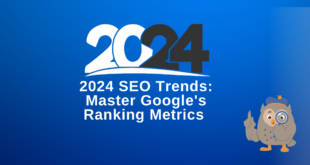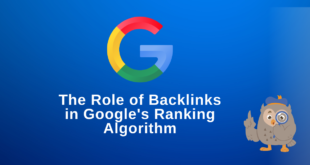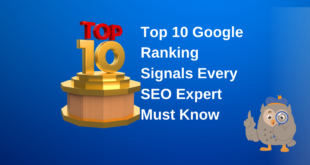In the ever-evolving world of SEO, understanding the factors that influence Google’s search ranking is essential for any website looking to succeed in 2024. With Google continually updating its algorithm, staying on top of ranking factors is crucial. This guide will walk you through the key elements that impact your Google ranking this year, with a special focus on the importance of Click-Through Rate (CTR) and how it can drive your SEO efforts.
What Are Google’s Ranking Factors?
Google uses over 200 different ranking factors to determine how pages should rank on its search engine results pages (SERPs). These factors include content quality, backlinks, user experience, and much more. In 2024, some ranking factors have become even more important, while others remain consistently significant.
1. Content Quality and Relevance
Content has always been a cornerstone of Google’s ranking algorithm. The most important factor in content quality is whether it answers the user’s query comprehensively and accurately. Google’s algorithm is becoming more sophisticated at understanding the intent behind searches, so high-quality, informative, and relevant content is a must.
- Expertise and Authority: Google values content that demonstrates expertise, authoritativeness, and trustworthiness (E-A-T). Websites that establish authority in their niche are more likely to rank higher.
- User Engagement: Google’s goal is to provide users with the best possible experience. Content that keeps users engaged, drives interaction, and provides value is more likely to rank well.
2. Backlinks and Link Building
Backlinks remain one of the most influential ranking factors in 2024. However, it’s no longer just about the quantity of backlinks, but their quality. Google rewards pages with backlinks from authoritative and relevant sites. The focus should be on acquiring natural backlinks from reputable sources within your niche.
- Dofollow vs. Nofollow Links: Dofollow links pass link equity, which is a signal to Google that your page is trustworthy. Nofollow links, on the other hand, don’t pass link equity, but they can still bring traffic.
- Link Diversity: A mix of backlinks from various sources, such as blogs, news outlets, and educational websites, is valuable.
3. User Experience (UX) and Site Speed
User experience has become a central component of Google’s ranking algorithm, and for a good reason. Google wants to ensure that users have a seamless and positive experience when visiting a website. Factors like page load speed, mobile-friendliness, and navigation all play a role in how well your site ranks.
- Core Web Vitals: In 2024, Google places significant emphasis on Core Web Vitals, which assess the loading performance, interactivity, and visual stability of your pages.
- Mobile Optimization: With mobile-first indexing, Google primarily uses the mobile version of your website for ranking. Ensure your site is responsive and provides a smooth mobile experience.
- Site Structure: A well-structured site helps Google crawl and index your pages more effectively. This includes having a clean URL structure, easy navigation, and an XML sitemap.
4. Click-Through Rate (CTR)
Click-Through Rate (CTR) is a critical ranking factor that is often overlooked. CTR measures the percentage of people who click on your website link after seeing it in the search results. A higher CTR indicates that your content is relevant and appealing to users. But how exactly does CTR impact your ranking?
- Higher CTR = Better Ranking: Google considers a high CTR as a sign that your page is providing value to searchers. When your result stands out and gets more clicks, Google views it as more relevant and authoritative, which can lead to higher rankings.
- Snippet Optimization: To improve your CTR, you must optimize your search snippets (title tags and meta descriptions). These elements are the first thing users see, so they should be compelling and relevant to the search query.
- Title Tags and Meta Descriptions: Craft compelling title tags that include your target keyword and create a sense of curiosity or urgency. A clear, concise meta description can also encourage users to click on your link.
- Rich Snippets: Using structured data can help your pages appear as rich snippets in the search results, which are more likely to attract clicks. Rich snippets include extra information like ratings, prices, or even images.
5. Search Intent and Semantic Search
Understanding and addressing search intent is one of the most important aspects of SEO in 2024. Search intent refers to the reason behind a user’s search. It’s essential that your content aligns with what the user is looking for.
- Informational Intent: Users want to learn something. Your content should provide valuable information, backed by research, to meet this intent.
- Transactional Intent: Users are looking to make a purchase. Ensure your content is optimized for conversions with clear calls-to-action (CTAs).
- Navigational Intent: Users are searching for a specific website or page. Ensure your site structure is intuitive and easy to navigate.
Google’s ability to understand semantic relationships between words means that simply matching keywords isn’t enough. Google looks at the overall context of your content to determine whether it satisfies the user’s intent.
6. Social Signals and Brand Mentions
While social media signals (likes, shares, and comments) are not direct ranking factors for Google, there is evidence to suggest that they can indirectly influence rankings. High engagement on social platforms can drive traffic to your site, which in turn can lead to more backlinks and better CTR.
- Brand Mentions: Google also considers brand mentions across the web as a sign of authority and relevance. If your brand is frequently mentioned in high-authority contexts, it can help boost your rankings.
7. Technical SEO and Structured Data
Technical SEO ensures that search engines can crawl and index your website effectively. Without a solid technical foundation, even the best content will struggle to rank.
- Structured Data: Using schema markup helps Google understand the content of your pages and can enhance your search result listings with rich snippets. This can increase your CTR, which, as we’ve seen, can influence your ranking.
- HTTPS: Sites that use HTTPS encryption are prioritized by Google. Security is essential for user trust and is a ranking factor.
- Internal Linking: Proper internal linking helps spread link equity throughout your site and improves the crawlability of your pages.
8. CTR: Why It Matters More Than Ever
Now that we’ve covered some essential ranking factors, it’s clear that CTR plays a huge role in 2024. Here’s why:
- User Behavior Data: Google uses user behavior data to assess the relevance of a page. A high CTR signals that your page is the right answer to a query.
- Improved Ranking Potential: Pages with higher CTRs are more likely to rank better. It’s a direct signal that users are finding your page valuable and engaging.
- CTR and Keywords: While keyword optimization is still important, CTR can sometimes outperform traditional SEO techniques in terms of ranking. If your page consistently attracts clicks, Google will take notice.
In 2024, the SEO landscape continues to evolve, and Google’s ranking factors are becoming more sophisticated. To succeed, focus on creating high-quality content, building authoritative backlinks, optimizing for user experience, and boosting your CTR. By understanding and implementing these strategies, you can stay ahead of the competition and improve your rankings on Google’s search results.
If you’re looking to get more tailored advice and enhance your website’s performance in search engines, consider consulting with experts. Our WordPress SEO Optimization services are designed to help you implement these strategies effectively and see tangible results.
FAQ
Q1: How can I improve my CTR?
Focus on optimizing your title tags, meta descriptions, and using rich snippets. Make sure your content is aligned with search intent.
Q2: Does CTR directly affect my Google rankings?
Yes, a higher CTR signals to Google that your page is relevant and useful, which can help improve your rankings.
Q3: How can I ensure my content is high-quality?
Ensure your content is informative, well-researched, and addresses the user’s search intent. Also, focus on readability and engagement.
Q4: What are Core Web Vitals, and how do they impact SEO?
Core Web Vitals measure the user experience of your website, focusing on loading speed, interactivity, and visual stability. Google uses these metrics to rank pages.
 High-Quality Backlinks for SEO Success | Backlink eStore
High-Quality Backlinks for SEO Success | Backlink eStore




